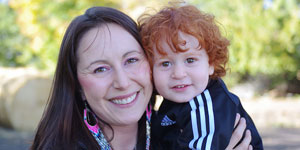Family Life
4 min Read
Emilea Saadeh helps First Nations people in Edmonton on a path to healing, one friend at a time

June 20, 2016
Family Life
4 min Read

June 20, 2016

In the wake of the Truth and Reconciliation Commission, First Nations parents and activists work to erase the legacy of residential schools and look to the future.
Reporter Amber Nasrulla spoke with Emilea Saadeh, mother of three-year-old Silva and an urban partnership administrator at the Alberta Native Friendship Centres Association (ANFCA) in Edmonton. “I’ll be a ‘lifer’ here,” says Emilea. “I’m very lucky the environment and culture of my workplace allows me flexibility as a mother.” Emilea oversees 43 projects while working with the Alberta Aboriginal Youth Council and Elders’ Wisdom Circle.

“People are focusing on the word ‘healing’ because it encompasses everything. A big piece of that is strengthening families.
“We just developed a new report with recommendations on implementing the policies of the United Nations Rights of Indigenous Peoples throughout Alberta’s urban communities. In addition to the TRC, it’s a big focus right now. We conducted urban community dialogues in 21 cities and towns in Alberta. We focused on 20 Alberta Friendship Centres and one other Urban Aboriginal Organization.
“We are looking at first steps on how to start the healing process and a big piece of it is focusing on and awareness and teaching people the impacts that residential schools had on communities. And colonization in general. One of the biggest impacts is on how families work. Going back to the strength of our Indigenous roots is important.
“A big initiative we’ve undertaken at ANFCA is I Am a Kind Man, which was shared with us by the Ontario Federation of Indigenous Friendship Centres. It’s an awareness campaign where community facilitators focus on the role that men and boys play in ending violence against Indigenous women and girls.
“It reminds us that violence has never been an acceptable part of Indigenous culture. It embraces the seven sacred teachings, which show us how to live in harmony with creation through wisdom, love, respect, bravery, honesty, humility, and truth.
“I love my job and believe strongly in the organization. Mothers and children are given incredible value and importance, so I’m often encouraged to bring my son along to work-related events, meetings, activities and travel.
“Silva is the whitest reddest haired kid ever! My husband I obviously have the recessive red-haired gene. Silva loves watching YouTube videos of Indigenous Drum Groups. He used to take a spatula and drum on the laundry basket. He has a real hide, hand drum now, and takes it down the street for walks, trying to sing and drum along the way. It’s so cute!
“As for me, I wasn’t close to my culture at all growing up. And here’s why… My moshom [grandfather in Cree] was in residential school. He was taken when he was six and was there until he was 14. His parents passed away while he was in residential school. He lost a lot of his language and a lot of his culture. He didn’t learn how to be a parent.
“It really had an impact on how my mom was brought up and it had an impact on me. My mum didn’t learn how to hug and say, ‘I love you’. It wasn’t said to her when she was growing up. It wasn’t expressed to me. I’m glad that I do say that to my son.
“It wasn’t until my mum was battling cancer a few years ago that I forced myself to say, ‘I love you’ to her. It’s not that we didn’t love each other. We just never said it. It felt really weird. That’s just a small impact. But these are generational effects.
The Truth and Reconciliation Commission (TRC) has many goals, such as improving Indigenous lives through legal equity, supporting education and health programs, improving child welfare, and preserving Indigenous language, culture, and spiritual traditions.